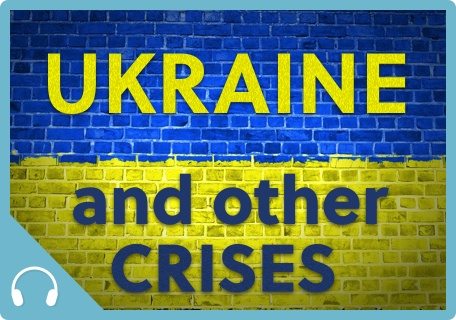This week we’re going to be talking about what’s been going on in the Ukraine and what implications it might have for UK investors. I’m joined once again by Justin Urquhart Stewart, friend of the show and director my sponsors Seven Investment Management.

Long-time listeners to the show will know the sultry sound of Justin Urquhart Stewart’s voice. He is also very visually recognisable with his trademark red braces. But Justin is not here because he is a sponsor of the show. In fact, 7IM never ask me for anything in return for their support, but he’s more than willing to give us the benefit of his wisdom and experience, particularly at times which are challenging and concerning for investors.
So I wanted to pick Justin’s brains on the situation in Ukraine which I know is worrying many people and also give his take on what he thinks is happening generally in the world economy.
Click to Listen
Podcast: Subscribe in iTunes | Play in new window | Download
After the main body I’m going to look at the most recent reviews that have been left by listeners, cover any news that has happened this week and announce the next session topic. If this show is of any use to you, it would help me massively if you would take the time to leave me a review on iTunes. This has a huge impact on keeping me near the top of the rankings, which in turn helps more people to find the show and to subscribe. I’ll remind you again at the end of the show, but if you want to do it right now, just click the button below:
But first…
 Sponsor Message
Sponsor Message
This podcast is brought to you with the help of Seven Investment Management, a firm of investment managers based in London. They put their name to my show and to my site and videos because they believe in what I’m doing, and I’m very grateful for their support. You can see what they’re up to at 7im.co.uk
Interview with Justin Urquhart Stewart
Here are the questions I asked Justin and the key points of his responses:
Q1 – The crisis in the Ukraine seemed to spring up very quickly and reach a zenith with the ousting of the President. Now this week the region of Crimea is to have a referendum as to whether or not to remain part of the Ukraine. Clearly there is a big shift going on there. How have markets reacted?
There are nerves initially as the markets respond primarily to the media. But then they start to actually look at the economy and the businesses behind the economy. And until something really serious happens (Justin gave the example of an Ursine paw on the gas tap!) the markets will bide their time and not move too much.
Q2 – How have the other major economies reacted and why?
US ideologies differ between the major economies. Obama coming under fire for not making threats of ‘direct action,’ when in fact, he is never going to do that. In essence then, in the US this is a political issue.
But in Europe the whole thing is much closer to home. We’re direct neighbours and we need their gas. There is also a great deal of Russian money slushing around in London and Berlin. Because of this, the European nations are keen to deal with the whole situation in a much more intelligent, diplomatic way rather than pointing any guns in Russia’s direction.
Q3 – What does this whole crisis mean for investors?
This is just one crisis among many potential crises – Justin is far more worried about Japanese/Chinese dispute over the islands in the South China Sea – but investors need not to worry about that from day to day. If they did they’d never invest at all. Instead, stay calm, take the media reports with a pinch of salt and diversify your portfolio. Also, avoid the temptation to come in and out of the market based on news. “It’s time in the market, not timing the market.”
Q4 – Moving closer to home, it seems like there is lots of good news out there right now, and that the UK economy is recovering, along with some others. Are we out of the woods after the credit crunch?
Green shoots or advanced mould?! Businesses are doing well. Last year we started up 520,000 new businesses. Half will fail within three years – this is normal – but we are far more entrepreneurial than ever before. But the recovery as it is is not sustainable. We need investment into infrastructure and housebuilding; getting money into industry. The banks are not in a position to do this so it needs initiative from government. Housing, service and manufacturing are all picking up. It’s coming from a low base but we are slowly, steadily improving.
Economies are still being supported by the stimulants of Quantitative Easing, but these are very, very slowly being reduced, but it will take ages to come off them entirely.
Q5 – Are there any possible risks on the horizon, both here and abroad? Europe?
Yes, but Justin was keen to stress that if your financial planning is right, and your money invested according to your timescales and tolerance for risk, then you needn’t worry too much about the macro risks to the economy.
Q6 – Is there a way to invest which minimises the impact of markets shocks and jitters like this?
Yep – see the DO section below
After the interview: What you need to DO
Bearing in mind everything that the oracle said, what practical steps should you take, if any?
1 – Diversify
So obvious as to almost go without saying, it is essential to diversify your portfolio, to spread it around so that if one asset class or region goes awry, the others will offset the damage. There swill always be an impact as there is no such thing as two or more perfectly balancing asset classes, but the surest way to lose money unnecessarily is to have all your eggs in one basket.
2 – Filter the news
Remember that all the media outlets have things to sell and their sole aim is to attract your eyeballs or eardrums. This means you should have many pinches of salt handy with which to take your news. Usually there is a great deal more to any given situation than any news outlet has the time or inclination to include in their coverage.
3 – Take the long view
Any global political or economic event can seem huge at the time but in the context of many year will probably just look like a blip. Even the market crash of the credit crunch, when viewed from today’s perspective, just looks like a nasty downturn, but which has been fully recovered from since then. So don’t sweat too much about today, as long as you have enough time left to invest. If you’re within a short time of a major deadline, like retirement, you should be invested in such a way as to minimise market shocks.
4 – Invest, don’t trade
Don’t be tempted to move in and out of markets to avoid the dips and take advantage of the up-ticks. You won’t manage it and will in fact damage your returns by incurring unnecessary costs. No-one can time the market, least of all you. Or me.
Summary
My thanks to Justin Urquhart Stewart for his time and wisdom, and again to 7IM for their ongoing support of MeaningfulMoney
This week’s reviews
[This is where I read the reviews!!]
If you like what you hear on this podcast, please leave a rating or review on iTunes by going to meaningfulmoney.tv/iTunes just like Glen.w, cmurray89135, racat99 and tomasz.jureczko did last week. This helps others to hear about the show and to subscribe, because it keeps me near the top of the rankings.
News
Another record week of downloads which is very exciting. 3,700 last week and likely to be another good week this week. Thanks to all who are listening and reviewing – it really helps! If we keep going then the show will one to the attention of more people who need it, and that’s the mission.
No weight loss again this week. Hmmm. Need to get my backside in gear. I’m going to hit the 5:2 diet again, starting as soon as I can get to the supermarket to stock up on essentials. But basically I’ve taken my eye off the ball, for which I hang my head in shame. The goal is to be 14 stone by the time I’m 40, in February 2015. I am currently 17st 7.5, so I have a very long way to go. First milestone is to be under 17 stone.
There’s a great personal finance blogger who is also a Twitter buddy of mine. His name is Damien Fahey and he blogs at moneytothemasses.com. He has written a great little book called the 30 Day Money Plan – Take control of your finances in just 5 minutes per day. I’ve not read it through yet, but what I have seen is great. Lots of quick and easy tips to make a difference to your finances with hardly any effort. It’s well worth a look. It’s Kindle only I think but is a steal at £1.99. Easy link: meaningfulmoney.tv/30days
Next Session Announcement
Next time we'll be talking about Giving Money Away If you have a question on this subject, or any other financial query that you want answering here on the show, then the best way to do that is to leave me a voicemail at meaningfulmoney.tv/feedback
Outro
That's it for this session of the MM podcast, I hope it was helpful. Did I miss anything? Do you have any questions? If so, please leave them in the comments section below.
I hope you enjoyed this session. Thanks for listening – I'll talk to you next time.




Leave a Reply